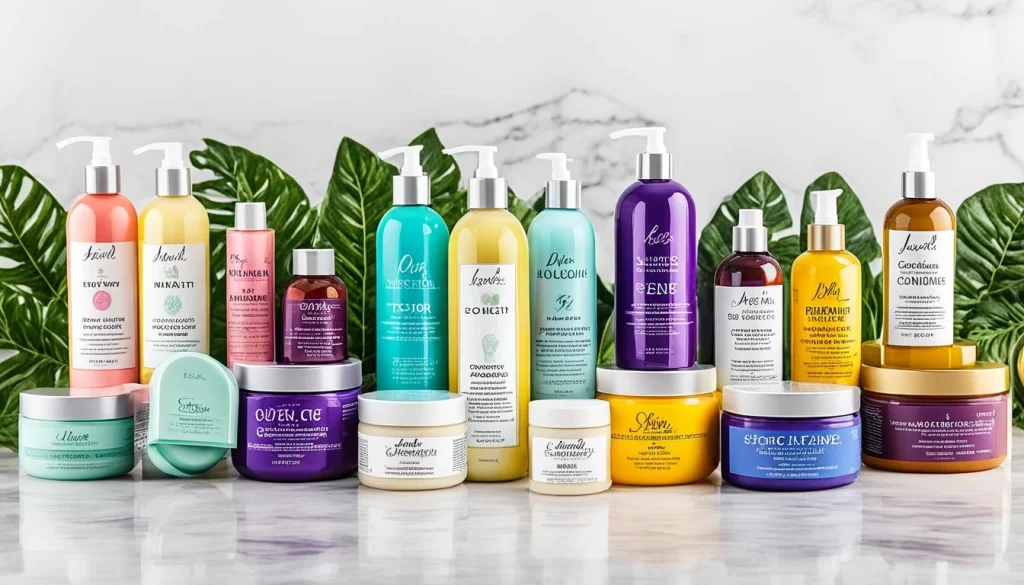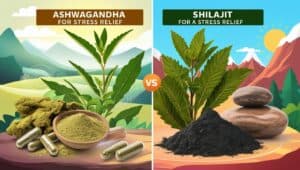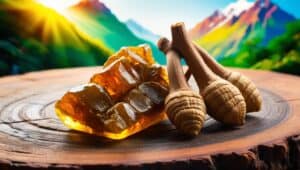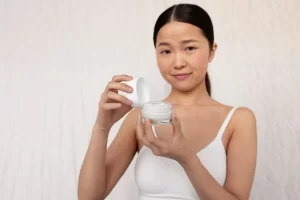
Afro Haircare Essentials: Tips & Products
With its distinct characteristics and needs, afro haircare is essential for maintaining its health and vibrancy.
Whether you have natural curls, coils, or kinks, it’s important to understand the specific requirements of your hair type.
 CLICK HERE TO LEARN MORE
CLICK HERE TO LEARN MORE 
Key Takeaways:
- Textured hair, like afro hair, requires specialized care for optimal health and manageability.
- Understanding the unique characteristics of afro hair is crucial in determining the best haircare routine.
- Using afro haircare products designed specifically for your hair type can make a significant difference in achieving desired results.
- A comprehensive daily haircare routine, including cleansing, moisturizing, and protective styling, is essential for afro hair.
- Preserving and protecting afro hair during the night can help maintain its health and prevent damage.
Understanding Afro Hair: Origins and Characteristics
Afro hair is a beautiful and unique hair type that has its origins in the African continent.
This type of hair, also known as kinky, coily, or textured hair, is characterized by its tightly coiled and spring-like curls.
Understanding the origins and characteristics of afro hair is essential for properly caring for and styling it.
Afro hair is believed to have evolved as an adaptation to the hot and dry climates of Africa.
Its tightly coiled structure helps to protect the scalp and hair from the intense sun and minimize moisture loss.
This curl pattern is thought to act as a natural barrier, preventing the sun’s rays from directly hitting the scalp and providing some insulation against heat.
The unique characteristics of afro hair make it more prone to dryness and breakage.
Its tightly coiled structure makes it difficult for natural oils to travel from the scalp to the ends of the hair strands, resulting in dryness and decreased elasticity.
This is why afro hair requires specific care and attention to maintain its health and vitality.
Here are some key characteristics of afro hair:
- Tightly coiled curls: Afro hair has tight, spiral curls that can range from small coils to larger curls. The curl pattern can vary, and each individual’s hair may have different curl sizes and shapes.
- Density: Afro hair tends to have a higher hair density, meaning that there are more hair strands per square inch compared to other hair types.
- Texture: Afro hair is known for its unique texture, which can range from fine to coarse. The texture of afro hair can also vary within individuals, with some areas being more coarse or fine than others.
- Shrinkage: Afro hair has a remarkable shrinkage factor, meaning that it can appear much shorter than its actual length when dry. This shrinkage is due to the tight curl pattern and can vary depending on the individual’s hair.
- Versatility: Despite the challenges it may present, afro hair is incredibly versatile and can be styled in various ways, including braids, twists, updos, and afros.
Understanding the origins and characteristics of afro hair is crucial for embracing and celebrating its natural beauty.
By recognizing the unique needs of afro hair, we can tailor our haircare routines and product choices to ensure optimal health and manageability.
In the following sections, we will delve deeper into the evolution of afro haircare, daily maintenance routines, essential products, and more.
The Evolution of Afro Haircare
Afro haircare has a rich history that spans centuries, with practices evolving to meet the unique needs of this hair type.
Understanding the evolution of afro haircare provides valuable insights into the techniques and products that have been developed over time.
“The history of afro haircare is deeply rooted in the cultural traditions and experiences of black communities. It reflects the resilience and creativity of individuals who have embraced and celebrated their natural hair.”
In the early days, afro haircare revolved around natural ingredients and methods passed down through generations.
These included the use of oils, herbs, and fruits to cleanse, condition, and style the hair.
As technology advanced, new products and techniques emerged, catering specifically to the needs of afro-textured hair.
- Hot combs and straightening irons: In the 19th and early 20th centuries, hot combs were commonly used to straighten afro hair, making it more manageable and conforming to Eurocentric beauty standards.
- Chemical relaxers: The invention of chemical relaxers in the early 1900s provided an alternative to hot combing. These products permanently straightened the hair, but they also came with potential damage and health risks.
- The natural hair movement: In the later part of the 20th century and continuing to the present day, there has been a resurgence in embracing natural hair. This movement advocates for the acceptance and celebration of afro-textured hair in its natural state.
Today, the market is filled with products specifically designed for afro haircare, ranging from shampoos and conditioners to moisturizers, styling creams, and protective hairstyles.
Professionals and experts have also emerged, offering specialized knowledge and guidance for those seeking to maintain and enhance their afro-textured hair.
This evolution of afro haircare has created a vast array of options and opportunities for individuals with afro-textured hair to express their unique style and identity.
To better understand the progression of afro haircare methods and techniques, let’s explore a timeline of key milestones in the evolution of afro haircare:
| Date | Development |
|---|---|
| Early centuries | Traditional practices using natural ingredients |
| 19th and early 20th centuries | Hot combs and straightening irons become popular |
| Early 1900s | Introduction of chemical relaxers |
| Mid-1900s – present | Natural hair movement gains momentum |
This timeline showcases the continuous development of afro haircare practices, highlighting the shift towards embracing natural hair and the increasing availability of products tailored to afro-textured hair.
By understanding the evolution of afro haircare, individuals can make informed choices about the products and techniques that best suit their unique needs.
Stay tuned as we delve into a comprehensive daily maintenance routine and recommend essential products for afro haircare in the upcoming sections.
Taking Care of Afro Hair: Daily Maintenance Routine
Proper daily care is essential for maintaining the health and beauty of your afro hair.
By following a comprehensive daily maintenance routine, you can keep your hair nourished, moisturized, and protected.
In this section, we will guide you through the key steps to take care of your afro hair on a daily basis.
Cleansing
Start your daily afro haircare routine by cleansing your hair to remove any buildup of dirt, oils, and product residues.
Use a gentle sulfate-free shampoo formulated for afro hair to avoid stripping away natural oils.
Massage the shampoo into your scalp, working it through the length of your hair. Rinse thoroughly and repeat if necessary.
Moisturizing
Afro hair tends to be naturally dry, so moisturizing is an important step in your daily routine.
Apply a nourishing leave-in conditioner or moisturizing hair cream to damp hair, focusing on the ends and areas prone to dryness.
Use your fingers or a wide-toothed comb to distribute the product evenly and detangle your hair gently.
Protective Styling
Protective styling plays a crucial role in maintaining the health and length of your afro hair. Choose styles that minimize manipulation and protect your ends, such as braids, twists, or updos.
Before styling, ensure your hair is moisturized and apply a natural oil or butter to seal in the moisture.
Avoid styles that pull tightly on your hair, as this can lead to breakage.
Nighttime Care
During the night, it is important to protect your afro hair to prevent tangles, breakage, and dryness.
Sleep on a satin or silk pillowcase to minimize friction and maintain moisture.
Alternatively, wrap your hair in a satin or silk scarf before bed. If your hair is in a protective style, gently cover it with a satin bonnet or wrap to keep it secure.
To achieve and maintain healthy afro hair, consistency is key.
Make sure to follow this daily maintenance routine and adjust it according to your hair’s unique needs.
By prioritizing cleansing, moisturizing, and protective styling, you can keep your afro hair strong, beautiful, and manageable.
Essential Products for Afro Haircare
When it comes to afro haircare, using the right products is crucial for maintaining healthy, vibrant hair.
Afro hair has unique needs that require specialized care and attention.
From gentle cleansers to nourishing oils and styling products, choosing the best products for afro hair can make all the difference in achieving the desired results.
Shampoos
Using a gentle shampoo specifically formulated for afro hair is essential to avoid stripping the hair of its natural oils.
Look for sulfate-free shampoos that cleanse effectively without causing dryness.
Products infused with moisturizing ingredients like shea butter and aloe vera can help nourish and hydrate the hair.
Conditioners
Moisture is key when it comes to afro haircare, and a good conditioner is essential for locking in hydration.
Opt for deep-conditioning treatments that provide intense moisture and help to detangle and soften the hair.
Look for products enriched with natural oils like argan oil or coconut oil to nourish and strengthen the hair.
Oils
Afro hair tends to be naturally dry, so incorporating oils into your haircare routine can help nourish and moisturize the hair.
The best oils for afro hair include jojoba oil, grapeseed oil, and castor oil.
These oils not only hydrate the hair but also improve scalp health and promote hair growth.
Styling Products
When it comes to styling afro hair, it’s essential to choose products that provide hold, definition, and moisture without causing damage.
Look for styling creams, gels, and mousses specifically formulated for textured hair.
These products should help to enhance curls, reduce frizz, and provide long-lasting hold without leaving a sticky residue.
 CLICK HERE TO LEARN MORE
CLICK HERE TO LEARN MORE 
Remember, everyone’s hair is unique, so it may take some trial and error to find the products that work best for you.
Consider consulting with a hair professional who specializes in afro hair to get personalized recommendations tailored to your specific needs.
By using the right products for your afro hair, you can achieve healthy, nourished, and stunning hair every day.
Afro Haircare at Night: Protecting and Preserving
Proper nighttime care is essential for maintaining the health and beauty of your afro hair.
It’s during these hours of rest that your hair undergoes repair and growth, making it crucial to ensure it stays protected and well-nourished.
By following these expert tips and techniques, you can wake up to manageable and vibrant afro hair each morning.
Tips for Afro Haircare at Night
- Protective Styling: Before going to bed, consider protective styles like braids, twists, or a satin bonnet. These styles help minimize friction and tangles that can lead to breakage while you sleep.
- Satin or Silk Pillowcase: Switching to a satin or silk pillowcase reduces friction and prevents moisture loss from your hair. The smooth surface also helps maintain the shape of your hairstyle.
- Satin or Silk Scarf: If you prefer not to use a silk pillowcase, wrapping your hair in a satin or silk scarf can achieve similar benefits. This method protects your hair from rubbing against cotton or other abrasive materials.
- Moisturize: Apply a moisturizer or leave-in conditioner to your hair before bedtime. This step helps seal in moisture, keeping your hair hydrated throughout the night.
- Use a Wide-Tooth Comb: Gently detangle your hair with a wide-tooth comb or your fingers before going to bed. This practice prevents knots and tangles that can be difficult to manage in the morning.
Techniques for Preserving Afro Hair
Preserving your afro hair’s texture and shape is vital for maintaining your desired look. Consider incorporating these techniques into your nighttime routine:
- Pineapple Method: Gather your hair at the top of your head, creating a loose high ponytail. This technique elongates your curls, preventing them from being squashed or flattened while you sleep.
- Braiding or Twisting: Section your hair and braid or twist it loosely before bed. This approach preserves your hair’s texture and definition while reducing frizz.
- Satin-Lined Cap: For added protection, invest in a satin-lined cap. This accessory can be worn over your protective style or directly on your hair to shield it from friction and maintain moisture.
A consistent nighttime haircare routine using these methods will contribute to the overall health and appearance of your afro hair.
By following these tips and techniques, you can wake up to gorgeous, well-protected hair every morning.
| Benefits of Afro Haircare at Night: |
|---|
| 1. Minimizes breakage and split ends caused by friction |
| 2. Preserves natural hair texture and definition |
| 3. Protects against moisture loss |
| 4. Reduces tangles and knots |
| 5. Maintains the shape of your hairstyle |
The Significance of Afro Hair in Cultural Identity
Afro hair holds a profound cultural significance and serves as a powerful symbol of identity and representation within diverse communities.
Embracing and celebrating natural afro hair showcases the beauty of the unique textures and patterns that contribute to the rich tapestry of cultural heritage.
Afro hair has long been associated with resilience, strength, and pride, reflecting the history and journey of Black individuals.
It symbolizes the resilience of the African diaspora, representing a connection to ancestral roots and a celebration of cultural heritage.
The various styles and hairstyles that can be achieved with afro hair not only contribute to personal expression but also serve as a form of cultural expression and artistic creativity.
“Afro hair is a crown that defies gravity, embracing and showcasing the beauty of individuality and diversity.” – Renowned stylist, Lisa Grant
The cultural significance of afro hair extends beyond personal identity and resonates in broader social and political contexts.
It challenges mainstream beauty standards, dismantles discriminatory norms, and promotes inclusivity.
Additionally, afro hair has played a pivotal role in the history of activism, as individuals with afro hair have used their hairstyles as a powerful statement of resistance and defiance against oppression.
The celebration and acceptance of afro hair in all its natural glory empower individuals to embrace their authentic selves, fostering a sense of belonging and cultural pride.
This recognition of the cultural significance of afro hair not only honors centuries of heritage but also promotes a more inclusive and diverse society that celebrates and appreciates the beauty of all hair types.
Key Points:
- Afro hair serves as a symbol of resilience, strength, and pride.
- It represents a connection to ancestral roots and a celebration of cultural heritage.
- Afro hair challenges mainstream beauty standards and promotes inclusivity.
- Individuals with afro hair have historically used their hairstyles as a form of activism and resistance.
- This celebration of afro hair fosters a sense of cultural pride and belonging.
| Cultural Symbols | Description |
|---|---|
| Hairstyles | Various afro hairstyles, such as the afro puff, Bantu knots, and braids, carry cultural significance and represent personal and communal identity. |
| Headwraps | Headwraps, such as gele and turban styles, are not only fashion statements but also convey cultural heritage, traditions, and regional affiliations. |
| Accessories | Adornments like cowrie shells, beads, and African-inspired accessories are frequently used to enhance afro hairstyles and connect to cultural roots. |
 CLICK HERE TO LEARN MORE
CLICK HERE TO LEARN MORE 
The Common Challenges of Afro Haircare
While afro hair is undeniably beautiful and unique, it also presents specific challenges when it comes to care and maintenance.
Understanding and addressing these challenges is key to maintaining healthy and vibrant afro hair.
1. Detangling
One of the most common challenges faced by individuals with afro hair is detangling.
The tight curls and coils of afro hair can easily become tangled, leading to breakage and damage.
Regular and gentle detangling is essential to prevent knots and maintain the integrity of your hair.
2. Breakage
Afro hair is prone to breakage due to its natural texture.
The curls and coils create weak points in the hair shaft, making it more susceptible to damage.
Proper moisturization, deep conditioning, and protective styling can help minimize breakage and promote hair health.
3. Dry Scalp
Dry scalp is another common challenge that individuals with afro hair may face.
The tight curls can make it difficult for natural oils to spread throughout the hair and scalp, leading to dryness and itching.
Regular scalp moisturization and the use of hydrating products can help combat dryness and promote a healthy scalp.
“Maintaining afro hair requires patience, gentle handling, and a thorough understanding of its unique needs. By addressing challenges such as detangling, breakage, and dry scalp, you can maintain a healthy and beautiful afro hair.” – Dr. Michelle Thompson, Trichologist
Overcoming these challenges requires a comprehensive approach to afro haircare.
Incorporating the right techniques and products can help you achieve and maintain healthy, manageable, and beautiful afro hair.
The Benefits of Natural Afro Haircare
When it comes to caring for afro hair, embracing natural haircare methods and using organic and homemade products can offer a plethora of benefits.
Natural afro haircare involves utilizing ingredients that are free from harmful chemicals and additives, allowing your hair to thrive in its natural state.
From promoting hair health and growth to reducing damage and breakage, incorporating natural products into your haircare routine can make a world of difference.
Nourishment and Moisture
One of the key benefits of natural afro haircare is the nourishment and moisture it provides to your hair.
Natural products are often rich in vitamins, essential oils, and plant-based ingredients that deeply hydrate and condition the hair shaft.
This helps to combat dryness and prevent moisture loss, leaving your hair soft, supple, and radiant.
Reduced Chemical Exposure
By opting for natural haircare products, you minimize your exposure to harsh chemicals commonly found in commercial hair products.
Synthetic ingredients, such as sulfates and parabens, can strip the hair of its natural oils, leading to dryness, brittleness, and other issues.
Natural products, on the other hand, are gentle on the hair and scalp, reducing the risk of irritation and adverse reactions.
Improved Hair Health
Natural afro haircare promotes overall hair health by focusing on the specific needs of textured hair.
Natural ingredients like shea butter, coconut oil, and aloe vera contribute to improved hair strength, elasticity, and manageability.
These ingredients help to repair damaged hair, prevent breakage, and stimulate healthy hair growth.
Sustainability and Environmental Consciousness
Embracing natural afro haircare also aligns with sustainable and eco-friendly practices.
Many natural haircare products are cruelty-free, vegan, and ethically sourced, ensuring minimal impact on the environment.
By choosing natural alternatives, you contribute to a cleaner, greener planet while taking care of your hair.
“Using natural haircare methods and products showcases a commitment to self-care, wellness, and embracing the uniqueness of your afro hair.”
| Benefits of Natural Afro Haircare |
|---|
| Promotes hair health and growth |
| Reduces damage and breakage |
| Deeply nourishes and moisturizes the hair |
| Minimizes exposure to harmful chemicals |
| Enhances hair strength, elasticity, and manageability |
| Aligns with sustainable and eco-friendly practices |
The Importance of a Healthy Afro Haircare Routine
Establishing and maintaining a healthy haircare routine is crucial for maintaining the overall well-being of afro hair.
With its unique texture and structure, afro hair requires specialized care and attention to stay healthy and vibrant.
A healthy haircare routine is not just about achieving aesthetic goals but also about promoting the strength, moisture, and vitality of your afro hair.
By implementing consistent practices and using the right products, you can enhance the health and appearance of your hair while preventing common issues such as breakage, dryness, and scalp problems.
Here are some key elements of a healthy afro haircare routine:
- Gentle Cleansing: Use sulfate-free shampoos or co-washing (conditioner-only washing) methods to cleanse your hair without stripping it of its natural oils. Avoid over-washing, as it can lead to dryness.
- Hydration and Moisture: Afro hair tends to be dry, so regular deep conditioning treatments, leave-in conditioners, and moisturizing products are essential to keep it hydrated. Incorporate techniques like the LOC (liquid, oil, cream) or LCO (liquid, cream, oil) method to lock in moisture.
- Protective Styling: Protect your hair from environmental damage and excessive manipulation by opting for protective styles such as braids, twists, buns, or updos. These styles help retain moisture and reduce breakage.
- Regular Trimming: Keep your hair ends healthy by scheduling regular trims. Trimming removes split ends and prevents them from traveling up the hair shaft, reducing breakage and promoting hair growth.
- Scalp Care: Nourish your scalp to maintain a healthy foundation for hair growth. Massage your scalp regularly with natural oils or scalp serums to improve blood circulation and stimulate healthy hair follicles.
Remember, consistency is key when establishing a healthy afro haircare routine.
By making these practices a regular part of your haircare regimen, you can cultivate healthy, strong, and beautiful afro hair.
Expert Tip:
“Don’t forget to protect your hair while sleeping. Use a satin or silk pillowcase or wrap your hair in a silk scarf to prevent friction and breakage while you sleep.” – Dr. Angela Johnson, Certified Trichologist
| Benefits of a Healthy Afro Haircare Routine | Best Practices for Maintaining Healthy Afro Hair |
|---|---|
| 1. Promotes hair growth | 1. Develop a consistent hair washing schedule |
| 2. Reduces breakage and split ends | 2. Protect your hair from heat damage by using heat protectant products |
| 3. Enhances moisture retention | 3. Use natural oils to seal in moisture after conditioning |
| 4. Minimizes hair damage | 4. Avoid tight hairstyles that can cause tension on the hairline and lead to breakage |
| 5. Improves scalp health | 5. Maintain a balanced diet rich in nutrients that support hair health |
Expert Insights and Recommendations for Afro Haircare
When it comes to afro haircare, expert advice can make all the difference in achieving healthy, vibrant, and well-maintained hair.
We have consulted with leading professionals in the field of afro haircare to bring you their valuable insights, tips, and product recommendations.
Expert Advice for Daily Haircare
“Consistency is key when caring for afro hair. Develop a daily routine that includes gentle cleansing, deep conditioning, and moisturizing. Avoid heat and chemicals, and protect your hair while sleeping with satin or silk materials.”
Recommended Must-Have Products
Choosing the right products is essential for maintaining the health of your afro hair. Here are expert-recommended products to add to your haircare routine:
| Product | Benefits |
|---|---|
| 1. Shea Moisture Jamaican Black Castor Oil Shampoo | Gently cleanses while promoting hair growth and strengthening |
| 2. Aunt Jackie’s Quench! Moisture Intensive Leave-In Conditioner | Provides intense hydration, detangles, and promotes softness |
| 3. Mielle Organics Pomegranate & Honey Coil Sculpting Custard | Defines curls, adds moisture, and reduces frizz |
| 4. As I Am DoubleButter Cream | Seals in moisture, promotes shine, and prevents breakage |
Tips for Protective Styling
“Protective styles are a great way to maintain and protect afro hair. Opt for braids, twists, or updos to minimize manipulation and reduce breakage.
Remember to keep your scalp clean and moisturized while wearing protective styles.”
Expert Insights on DIY Haircare
“Homemade hair treatments can be effective for afro hair. Ingredients like avocado, coconut oil, and aloe vera provide natural nourishment and moisture. Experiment with simple DIY recipes to find what works best for your hair.”
By incorporating these expert insights, following their advice, and using recommended products, you can elevate your afro haircare routine and achieve the healthy, beautiful hair you deserve.
 CLICK HERE TO LEARN MORE
CLICK HERE TO LEARN MORE 
Conclusion:Afro Haircare Essentials: Tips & Products
In conclusion, this article has provided essential tips, guidance, and recommendations for afro haircare.
By following these expert insights and using the right products, you can unlock the secrets to maintaining healthy, vibrant afro hair.
Throughout this article, we have explored the origins and characteristics of afro hair, the historical evolution of afro haircare, and the importance of establishing a daily maintenance routine.
We have also discussed the significance of afro hair in cultural identity, the common challenges faced in afro haircare, and the benefits of embracing natural haircare methods.
With a focus on providing the best care for your afro hair, it is crucial to invest in high-quality, specifically formulated products designed to meet its unique needs.
Whether it’s gentle cleansing, deep moisturizing, or effective styling, the right products can make a significant difference in promoting the health and vitality of your afro hair.
By adopting a holistic approach to afro haircare and understanding its individual characteristics, you can develop a tailored routine that addresses your hair’s needs, ensuring it looks and feels its best. Remember, afro hair is not just a hairstyle; it is a celebration of heritage, diversity, and personal identity.
Cherish your afro hair and embrace the journey of self-expression through healthy haircare practices.
FAQ
Are afros hard to maintain?
Afro hair requires special care and attention, but with the right techniques and products, it can be effectively maintained.
How often should I wash afro hair?
It is recommended to wash afro hair once a week to prevent drying out the hair and scalp.
What is the best way to take care of afro hair at night?
To care for afro hair at night, wrap it in a satin or silk scarf or use a satin pillowcase to prevent friction and preserve moisture.
How can I promote afro hair growth?
Regular scalp massages, a balanced diet, and using products containing natural ingredients that nourish and strengthen the hair can promote afro hair growth.
Are afros curly?
Yes, afro hair is characterized by its natural curl pattern, which ranges from tight coils to looser curls.
What is the history of afro haircare?
Afro haircare has a rich history dating back centuries, with various techniques and traditions originating from African cultures.
What are the best products for afro hair?
Some recommended products for afro hair include moisturizing shampoos, deep conditioners, leave-in conditioners, and natural oils.
How can I prevent damage to afro hair when using an afro pick?
To prevent damage, use a wide-toothed comb or a pick with rounded teeth, and be gentle when detangling afro hair.
Is it necessary to wash afro hair every day?
No, washing afro hair every day can strip it of its natural oils, leading to dryness and breakage. It is recommended to wash it once or twice a week.
Can African American hair grow fast?
African American hair can grow at a similar rate to other hair types, but it may require extra care to retain length and prevent breakage.
Related: Alterna Haircare: Luxury Solutions for Healthy Hair







